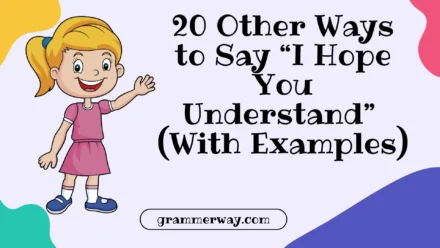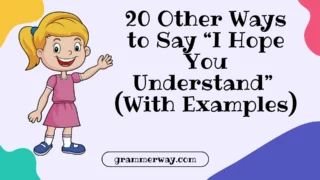Finding the right words to express empathy, care, and sincerity can make every message sound more genuine. The word “unfortunately” is polite but can sometimes feel too distant or emotionless. That’s why learning other ways to say “unfortunately” can help you speak with more warmth, understanding, and compassion — especially when delivering difficult or disappointing news.
This article will share 20 thoughtful alternatives with separate sections for their Scenario, Meaning, Examples, Tone, and Explanation, helping you choose the perfect phrase for every situation.
What Does “Unfortunately” Mean?
The word “unfortunately” means expressing regret or disappointment about something negative that has happened. It softens bad news and makes communication polite. However, it can sometimes make your message sound formal or emotionally flat. Using warmer alternatives can make your tone feel more human and understanding.
Is It Professional or Polite to Say “Unfortunately”?
Yes, “unfortunately” is both professional and polite. It’s used widely in workplaces, emails, and customer communication. Still, using it too often can sound repetitive or distant. By using alternatives, you can keep your tone professional while sounding kind, caring, and emotionally intelligent.
Synonyms for “Unfortunately”
- I’m sorry to say
- Regrettably
- Sadly
- I wish I could say differently
- I regret to inform you
- I’m afraid that
- It breaks my heart to say
- With regret
- To my disappointment
- I wish the outcome were different
- It pains me to say
- I hate to say this, but
- I’m disappointed to say
- It’s unfortunate that
- It saddens me to share
- I regret to say
- It’s with a heavy heart that
- Unfortunately, I must admit
- I’m not pleased to share
- I’m sorry this happened
1. I’m sorry to say
Scenario: Use this phrase when you need to share disappointing news but want to show empathy and concern.
Meaning: It expresses genuine regret and acknowledges the other person’s feelings without being too formal.
Examples:
- I’m sorry to say we won’t be able to approve your request.
- I’m sorry to say the event has been postponed.
- I’m sorry to say your package was delayed in transit.
- I’m sorry to say we’ve run out of that product.
- I’m sorry to say we couldn’t meet the deadline this week.
Tone: This phrase has a gentle, caring, and apologetic tone.
Explanation: It shows that you truly empathize with the person’s disappointment, helping your message sound personal and sincere.
2. Regrettably
Scenario: Use this in formal or professional settings when you need to stay respectful and polite.
Meaning: It communicates formal regret and softens the impact of negative information.
Examples:
- Regrettably, your order cannot be fulfilled at this time.
- Regrettably, the position has already been filled.
- Regrettably, we had to cancel the meeting due to scheduling issues.
- Regrettably, I won’t be available for the presentation tomorrow.
- Regrettably, your application didn’t meet our requirements.
Tone: It sounds professional, composed, and tactful.
Explanation: “Regrettably” is ideal when you need to balance professionalism with empathy, especially in emails or official notices.
3. Sadly
Scenario: Use this when sharing personal or emotional disappointment to express a heartfelt sense of sorrow.
Meaning: It shows genuine sadness and helps the listener feel your emotional connection to the situation.
Examples:
- Sadly, we couldn’t make it to your farewell party.
- Sadly, our favorite café has closed for good.
- Sadly, the project didn’t meet our expectations.
- Sadly, I missed the chance to see you before you left.
- Sadly, our plans fell through at the last minute.
Tone: It has a warm, emotional, and sympathetic tone.
Explanation: “Sadly” helps you sound authentic and compassionate, making your words feel emotionally honest instead of distant.
4. I wish I could say differently
Scenario: Use this when you hoped for a better outcome but must share disappointing news.
Meaning: It expresses true disappointment and a sincere wish that the situation were more positive.
Examples:
- I wish I could say differently, but we didn’t meet our sales target this quarter.
- I wish I could say differently, but your application wasn’t accepted this time.
- I wish I could say differently, but the product is out of stock.
- I wish I could say differently, but the client decided to move in another direction.
- I wish I could say differently, but our budget won’t cover this project.
Tone: It sounds honest, reflective, and empathetic.
Explanation: This phrase shows that you care about the outcome and truly wish things were better, helping build emotional connection and trust.
5. I regret to inform you
Scenario: Use this when you need to deliver formal or official bad news in a respectful and courteous way.
Meaning: This phrase communicates deep regret while keeping your message professional and tactful. It’s often used in business or academic settings.
Examples:
- I regret to inform you that your application was not successful.
- I regret to inform you that the event has been canceled due to weather.
- I regret to inform you that your payment could not be processed.
- I regret to inform you that we can’t move forward with this request.
- I regret to inform you that your proposal wasn’t selected.
Tone: The tone is formal, courteous, and serious.
Explanation: This phrase is perfect for official communication where you must maintain professionalism while still sounding considerate and respectful.
6. I’m afraid that
Scenario: Use this in casual or semi-formal conversations to express regret politely while keeping the tone friendly.
Meaning: It gently introduces bad news or disagreement without sounding harsh or overly direct.
Examples:
- I’m afraid that we’ve run out of that product today.
- I’m afraid that I can’t make it to the meeting.
- I’m afraid that we’ll need more time to finish the project.
- I’m afraid that the seats are already taken.
- I’m afraid that’s not possible at the moment.
Tone: It has a soft, conversational, and polite tone.
Explanation: “I’m afraid that” helps you deliver negative information in a gentle and natural way, avoiding a cold or blunt impression.
7. It breaks my heart to say
Scenario: Use this when you need to share personal, emotional, or heartfelt news that truly saddens you.
Meaning: This phrase expresses deep emotional pain and sincerity, showing that the situation genuinely affects you.
Examples:
- It breaks my heart to say we have to let go of this dream.
- It breaks my heart to say I can’t come to your wedding.
- It breaks my heart to say goodbye to such an amazing team.
- It breaks my heart to say our time together has come to an end.
- It breaks my heart to say we lost the opportunity.
Tone: It sounds emotional, tender, and deeply compassionate.
Explanation: This phrase shows that you are personally affected by the situation, helping your message feel genuine and heartfelt rather than distant.
8. With regret
Scenario: Use this in formal letters or professional communication when announcing negative outcomes or cancellations.
Meaning: It expresses a polite form of disappointment while maintaining professional courtesy.
Examples:
- With regret, we must cancel tomorrow’s event due to unforeseen issues.
- With regret, I inform you that your application was not approved.
- With regret, we’ll have to decline your invitation this time.
- With regret, we couldn’t complete the project within the expected time.
- With regret, our team won’t be participating this year.
Tone: It’s professional, formal, and considerate.
Explanation: This phrase fits best when you need to sound polite and composed, showing respect for the person even while delivering disappointing information.
9. To my disappointment
Scenario: Use this when you want to show that you personally feel let down by the outcome.
Meaning: It highlights your own emotional reaction while still keeping the tone respectful and calm.
Examples:
- To my disappointment, the results were not as we expected.
- To my disappointment, they canceled the trip last minute.
- To my disappointment, our idea wasn’t chosen this time.
- To my disappointment, the meeting didn’t go as planned.
- To my disappointment, she couldn’t make it to the celebration.
Tone: It’s personal, reflective, and emotionally honest.
Explanation: This phrase makes your message feel authentic because it reveals your own feelings, showing you care about what happened.
10. I wish the outcome were different
Scenario: Use this when you need to express regret about a decision or result that was beyond your control.
Meaning: It conveys sincere disappointment and empathy toward the person affected by the situation.
Examples:
- I wish the outcome were different, but we can’t approve this request.
- I wish the outcome were different, but the event must be postponed.
- I wish the outcome were different, but our plans have changed.
- I wish the outcome were different, but the offer has expired.
- I wish the outcome were different, but we must follow the policy.
Tone: It sounds empathetic, caring, and sincere.
Explanation: This phrase shows that you’re emotionally invested and that you truly wish things could have gone better for everyone involved.
11. It pains me to say
Scenario: Use this when you need to share emotional or disappointing news that truly makes you feel sad or regretful.
Meaning: This phrase shows deep emotional discomfort or sadness about what you are about to share.
Examples:
- It pains me to say we couldn’t save the partnership.
- It pains me to say your request can’t be accepted.
- It pains me to say that I won’t be attending your celebration.
- It pains me to say the decision didn’t go in your favor.
- It pains me to say we’re unable to help at this time.
Tone: It’s emotional, caring, and honest.
Explanation: This phrase shows that you are personally affected by the news and want to show empathy and respect toward the person you’re addressing.
12. I hate to say this, but
Scenario: Use this when speaking in informal or conversational contexts where you need to share unwelcome information gently.
Meaning: It expresses regret or discomfort about sharing something unpleasant but necessary.
Examples:
- I hate to say this, but your idea may not work this time.
- I hate to say this, but we might need to start over.
- I hate to say this, but the results weren’t what we expected.
- I hate to say this, but your flight has been canceled.
- I hate to say this, but the restaurant is already closed.
Tone: It’s casual, empathetic, and understanding.
Explanation: This phrase shows emotional honesty and helps you sound human and relatable, especially in friendly or casual conversations.
13. I’m disappointed to say
Scenario: Use this when you personally feel let down or sad about something not going as planned.
Meaning: It conveys personal regret or frustration, making your message sound sincere and emotionally open.
Examples:
- I’m disappointed to say our team didn’t meet the target.
- I’m disappointed to say the deal didn’t go through.
- I’m disappointed to say we couldn’t make the changes in time.
- I’m disappointed to say your application wasn’t successful.
- I’m disappointed to say we’ll have to delay the launch.
Tone: It’s personal, honest, and emotionally expressive.
Explanation: This phrase helps you show you care about the outcome, making the message more authentic and emotionally aware.
14. It’s unfortunate that
Scenario: Use this in both professional and casual contexts to express mild regret or disappointment.
Meaning: It means that something negative or undesirable happened, but it’s said in a neutral and polite way.
Examples:
- It’s unfortunate that we didn’t get the chance to meet.
- It’s unfortunate that the event was canceled.
- It’s unfortunate that your request couldn’t be processed.
- It’s unfortunate that the team faced unexpected delays.
- It’s unfortunate that the product isn’t available right now.
Tone: It’s neutral, polite, and professional.
Explanation: This phrase works well when you want to sound respectful but not overly emotional, striking a balance between formality and empathy.
15. It saddens me to share
Scenario: Use this when you need to communicate sad or emotional information in a genuine and heartfelt way.
Meaning: It expresses true sorrow or compassion about the situation you are talking about.
Examples:
- It saddens me to share that our project has come to an end.
- It saddens me to share that the opportunity is no longer available.
- It saddens me to share that the event has been postponed.
- It saddens me to share that our time together is ending.
- It saddens me to share that we must let go of this plan.
Tone: It’s tender, compassionate, and heartfelt.
Explanation: This phrase shows deep care and sensitivity, helping your message sound emotional yet graceful and kind.
16. I regret to say
Scenario: Use this in formal messages, letters, or professional emails when announcing negative outcomes.
Meaning: It means you are politely expressing regret about something unfortunate or disappointing.
Examples:
- I regret to say your submission did not meet the requirements.
- I regret to say the product is no longer in stock.
- I regret to say the team couldn’t complete the task.
- I regret to say the application was denied.
- I regret to say we’re unable to proceed with the offer.
Tone: It’s formal, professional, and polite.
Explanation: This phrase is ideal for official communication, allowing you to stay respectful and tactful while still expressing empathy.
17. It’s with a heavy heart that
Scenario: Use this when you must share very sad or emotional news, especially in personal or heartfelt messages.
Meaning: It expresses deep emotional sorrow and shows that delivering the message is painful for you.
Examples:
- It’s with a heavy heart that I announce our colleague’s departure.
- It’s with a heavy heart that I say goodbye to this amazing team.
- It’s with a heavy heart that we end this partnership.
- It’s with a heavy heart that we must close our branch.
- It’s with a heavy heart that I share this sad news.
Tone: It’s emotional, sincere, and deeply respectful.
Explanation: This phrase conveys authentic sadness and empathy, showing that you’re emotionally invested in what you’re saying.
18. Unfortunately, I must admit
Scenario: Use this when you need to be honest or transparent about a disappointing truth.
Meaning: It means you’re acknowledging a negative reality with sincerity and responsibility.
Examples:
- Unfortunately, I must admit that we didn’t meet our goal.
- Unfortunately, I must admit the plan didn’t work as expected.
- Unfortunately, I must admit that I made a mistake.
- Unfortunately, I must admit we should have acted sooner.
- Unfortunately, I must admit that the project needs more time.
Tone: It’s honest, reflective, and humble.
Explanation: This phrase shows accountability and sincerity, helping you build trust and respect through openness.
19. I’m not pleased to share
Scenario: Use this when you need to share disappointing information but want to stay professional and direct.
Meaning: It conveys mild dissatisfaction or regret about the information you are providing.
Examples:
- I’m not pleased to share that your order has been delayed.
- I’m not pleased to share that the plan didn’t work as expected.
- I’m not pleased to share that the report was returned for revision.
- I’m not pleased to share that we couldn’t secure the deal.
- I’m not pleased to share that we need to cancel tomorrow’s meeting.
Tone: It’s firm, respectful, and professional.
Explanation: This phrase is perfect when you want to stay composed yet show that you acknowledge and care about the disappointment.
20. I’m sorry this happened
Scenario: Use this when showing empathy and understanding for a difficult or disappointing situation.
Meaning: It expresses compassion and sympathy rather than formality, helping comfort the listener.
Examples:
- I’m sorry this happened — I understand how frustrating it must be.
- I’m sorry this happened — we’ll work on fixing it immediately.
- I’m sorry this happened — thank you for your patience and understanding.
- I’m sorry this happened — we’re doing our best to make it right.
- I’m sorry this happened — let’s find a better solution together.
Tone: It’s warm, compassionate, and reassuring.
Explanation: This phrase shifts focus from the problem to the person’s feelings, helping you show true empathy and emotional support.
Conclusion
Finding other ways to say “unfortunately” helps you communicate with empathy, warmth, and sincerity. Whether you’re writing a professional email, comforting a friend, or addressing a sensitive issue, these alternatives let you express regret and care without sounding distant or cold. Words truly matter — and choosing kind, thoughtful ones helps you connect better with every reader or listener.
FAQs
1. Can I use “unfortunately” in a professional email?
Yes, but try using softer alternatives like “regrettably” or “I’m sorry to say” to sound more personal and kind.
2. What can I use instead of “unfortunately” in customer service?
Try “I’m sorry this happened,” “I regret to inform you,” or “We understand your concern.”
3. Is “sadly” too emotional for business writing?
Not always. It depends on the context — in customer messages, “sadly” can sound empathetic and human.
4. How can I sound more polite when giving bad news?
Use phrases that show empathy and gratitude, like “Thank you for understanding” or “I appreciate your patience.”
5. What’s the most formal replacement for “unfortunately”?
The most formal options include “Regrettably,” “With regret,” and “I regret to inform you.”







Leave a Comment